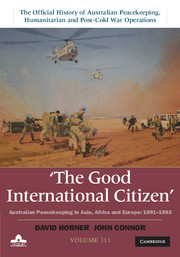Book contents
- Frontmatter
- Contents
- Maps
- Preface
- Chronology 1989–99
- Abbreviations
- Part 1 Strategy and policy
- Part 2 Cambodia
- Part 3 Western Sahara
- Part 4 Former Yugoslavia
- Part 5 Watch on Iraq
- 16 A new type of commitment
- 17 Disarming Iraq
- 18 A limited liability
- 19 Unscom and the US alliance
- Conclusion
- Appendix A United Nations Security Council resolutions
- Appendix B Major office bearers, 1991–99
- Bibliography
- Index
- Plate section
Conclusion
from Part 5 - Watch on Iraq
Published online by Cambridge University Press: 12 May 2022
- Frontmatter
- Contents
- Maps
- Preface
- Chronology 1989–99
- Abbreviations
- Part 1 Strategy and policy
- Part 2 Cambodia
- Part 3 Western Sahara
- Part 4 Former Yugoslavia
- Part 5 Watch on Iraq
- 16 A new type of commitment
- 17 Disarming Iraq
- 18 A limited liability
- 19 Unscom and the US alliance
- Conclusion
- Appendix A United Nations Security Council resolutions
- Appendix B Major office bearers, 1991–99
- Bibliography
- Index
- Plate section
Summary
The military operations and peacekeeping missions described in this volume marked a new phase in Australian peacekeeping. But before we reflect on these we need to recall what had gone before. From the beginning of Australian peacekeeping in 1947, through forty years to 1987, Australia deployed forces on peacekeeping missions in a haphazard manner with no clear relationship with Australia's declared defence policy. Individually, Australian peacekeepers performed well and, in a few instances, such as in Rhodesia and the Sinai, larger groups of peacekeepers were deployed and also performed effectively. Certainly, there were domestic reasons for Australia's modest commitment to peacekeeping, but internationally the Cold War prevented the resolution of many conflicts. Much of this changed with the end of the Cold War, which was becoming obvious by 1988 and was confirmed with the fall of the Berlin Wall in November 1989. At last, some of the world's long-standing conflicts began to be resolved, and the United Nations deployed ten new peacekeeping missions between 1988 and 1991.
As might be expected, Australia was asked to take part in some of these new missions and, as was described in volume 2, Australia contributed to the United Nations Iran–Iraq Military Observer Group in Iran (1988–90), to the United Nations Transition Assistance Group in Namibia (1989–90), to the United Nations Mine Clearance Training Team in Pakistan and Afghanistan (1989–93), to the Maritime Interception Force applying sanctions against Iraq in 1990 and to the First Gulf War in January–March 1991. A total of almost 2400 Australians were sent overseas in the missions covered by volume 2. Although no Australians were killed, the missions were arduous and demanding. More particularly, the Australians were confronted with some of the great tragedies of the last quarter of the twentieth century; they obtained glimpses of SWAPO's war for independence in Namibia, of the horrors of the Iran–Iraq War, and of the indiscriminate killing and maiming of Afghans by mines. They came to appreciate, if not fully understand, the complexities of international politics and the problems of working with the United Nations and US-led coalitions.
- Type
- Chapter
- Information
- The Good International CitizenAustralian Peacekeeping in Asia, Africa and Europe 1991–1993, pp. 534 - 541Publisher: Cambridge University PressPrint publication year: 2014



